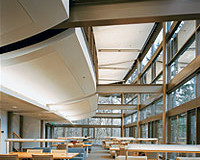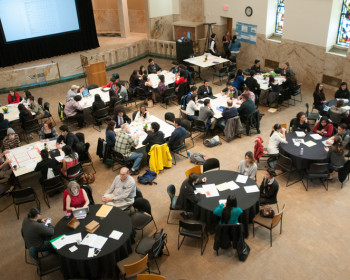Q & A with presenter Ryan F. Reese, PhD, LPC
Ryan F. Reese, PhD, LPC will be facilitating EcoWellness Counseling: Practical Strategies and Ethics for Integrating the Natural World into Therapy, on Friday, April 29. While this training will emphasize the application of EcoWellness to counseling settings, professionals and graduate students from diverse educational and professional contexts are welcome to attend. Registration is currently open here.
Can you explain ‘EcoWellness’ for those of us who are unfamiliar?
EcoWellness is one’s sense of appreciation, respect for, and awe of nature, resulting in greater feelings of connectedness to self and others on the pathway to healing and wellness. I use EcoWellness as a framework to guide my interactions with clients outdoors (or indoors) when assessing and integrating the natural world into counseling and therapy. It helps me be intentional.
What lead you to the development of EcoWellness?
I developed the EcoWellness construct in response to a lack of peer-reviewed counseling literature and research regarding the human-nature connection. The multidisciplinary realm of applied ecopsychology (ecotherapy) have been around for several decades, but I found myself wondering how to be purposeful with my integration of nature into traditional counseling settings (school counseling and 50-minute traditional counseling settings), and I wasn’t seeing a model out there to help me with this. So, I developed the model and I engage in research exploring how clinicians might effectively infuse the non-human world effectively into traditional counseling settings.
What populations respond the most to EcoWellness practices?
This is a great question. I think EcoWellness can be applied with a variety of populations. When I work with clients, nature is defined through their nature worldview, not mine, and this opens up a lot of possibilities. I work primarily with child, adolescent, and adult males in my practice presenting with a variety of mental health diagnoses, predominantly those presenting with depression and anxiety.
I find that people come to me when they’ve been through traditional counseling and want a different kind of experience or those people wanting to explicitly integrate nature into their healing. While more research is needed in clarifying which populations might benefit most from such an approach, I think that EcoWellness practice can be applied to a broad array of populations.
What should participants be prepared for/expect from your upcoming workshop?
This will be an interactive seminar—a balance between discussion, some information dissemination, and experimentation. I hope to expand conceptions about what it means to integrate “nature” into counseling. It doesn’t necessarily mean going outside. While I take my clients outdoors quite a bit, you can integrate EcoWellness practice easily into any approach. So, this workshop isn’t limited to those who solely want to focus on a nature-based approach.
In addition, I hope to facilitate some awareness regarding your own nature worldview—what shapes your own experience of nature and how might that impact your interactions with clients or students in the nature-based context. My hope is that each of us feels vitalized from the experience and we can walk away with some new ideas to bolster our practice as counselors and educators!
How do you like to spend your time in the great outdoors?
My absolute favorite thing in the world is to have fly rod in hand on a coastal river in Oregon or on the Olympic Peninsula in Washington state. I feel very connected with winter steelhead in particular—they are an intriguing and mysterious species—“grey ghosts”. We know a lot about them, but there’s a lot we don’t know. In many ways, they are “survivors”, each population on each river is different, and they are beautiful and resilient.
When not fishing, I love spending time hiking Central Oregon and spending time at the Oregon Coast. Or, in summer, time, going on multi-day rafting trips. There is no shortage of adventure here in the PNW!
-
New workshops and trainings are added to our calendar regularly. For the latest on professional development related to your specific interests, sign up for our mailing list!
More Continuing Education Stories
Center for Community Engagement is located in Rogers Hall on the Graduate Campus.
MSC: 85
email cce@lclark.edu
voice 503-768-6040
fax 503-768-6045
Director Matsya Siosal
Center for Community Engagement
Lewis & Clark
615 S. Palatine Hill Road MSC 85
Portland OR 97219

